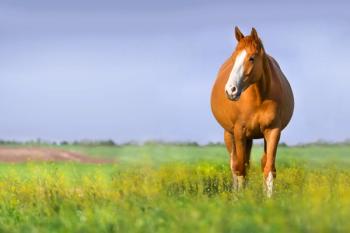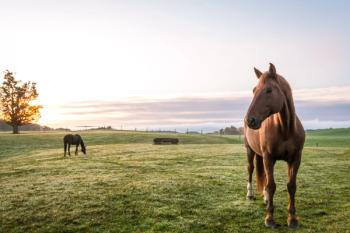
U.S. agency receives private offer to create wild-horse sanctuary
Reno, Nev. - Thousands of unadoptable wild horses in U.S. Bureau of Land Management (BLM) holding facilities could be saved from possible euthanasia or slaughter if the agency decides to accept an offer for a sanctuary.
RENO, NEV. — Thousands of unadoptable wild horses in U.S. Bureau of Land Management (BLM) holding facilities could be saved from possible euthanasia or slaughter if the agency decides to accept an offer from Madeleine Pickens, wife of Texas billionaire T. Boone Pickens, to create a large Western sanctuary for them.
"Wild mustangs are part of our national heritage. I can't imagine why anyone would not want to keep them in the wild and let them live out their natural lives," Mrs. Pickens tells DVM Newsmagazine in a telephone interview.
"I'm very troubled by this practice of horse slaughter and the lobbyists who work for it. I simply got tired of dealing with Washington and decided there has to be a better way to resolve this issue."
Mrs. Pickens says she has been looking for properties to buy that are on contiguous lands and provide summer and winter grazing land for the feral horses. She declined to confirm reports that she and those with whom she is working are seeking to acquire about 1 million acres for the sanctuary.
"The good thing is, the BLM likes our idea," Mrs. Pickens says. "I've also talked to (Nevada) Sen. Harry Reid, who also likes it and has wanted for years to work on an endowment fund to keep a program like this going, to provide a place where families could come out to see creatures like wild mustangs and bald eagles, our national treasures. It's been hard to get some of the bureaucrats on our side, but we're getting there and the best part is the BLM is on board."
The new Obama administration is likely to be more receptive and cooperative on this and other animal-welfare issues, Mrs. Pickens believes, "although that's not to say many Republican lawmakers haven't been with us, too. I emigrated to America, and I think that sometimes when you're born here you might not always know or appreciate the natural treasures you have."
Regarding those who advocate horse slaughter as a partial solution to the unwanted-horse problem, "it horrifies me to hear any horsemen even talk about that. It's unacceptable to me that those who take an oath to protect animals would be in favor of this. But I must say that we also have quite a number of veterinarians who are with us."
The eight-member National Wild Horse and Burro Advisory Board voted 7-1 at a meeting in Reno Nov. 17 to make several range-horse management recommendations to the BLM, including killing or selling "without restriction" about 10,000 unadoptable horses, out of about 30,000 currently in BLM short-term and long-term holding areas. But the recommendation states that euthanasia and selling without restriction (which means such horses could be taken to slaughter) would be the action of last resort.
Mrs. Pickens' offer to establish a sanctuary for all 30,000 horses, along with another offer from an unnamed party to take up to 5,000 horses, were presented at the meeting, attended by about 150. Mrs. Pickens is a Thoroughbred breeder, and she and her husband helped in the fight to close the nation's last horse slaughterhouse.
The bureau is considering the private help, which could face some bureaucratic hurdles, along with other possible actions to contain the mounting cost of keeping the horses, an agency spokesman says.
The advisory board made a total of 18 management recommendations at the meeting, including wider use of fertility control. All are posted soon on the Web at
The BLM currently spends almost 75 percent of its $37 million annual budget caring for the horses held at nearly 200 facilities in 10 Western states, leaving it short of funds to manage thousands more free-ranging horses in the West.
Horse adoptions have declined in recent years because of higher fuel and feed costs. They dropped from 5,071 in fiscal 2005 to 4,772 in fiscal 2007. To maintain its total wild-horse and burro management program, including removal and holding programs, the BLM says it would need $58 million in 2009, $65 million in 2010, $74 million in 2011 and $77 million in 2012. But help from the private sector and some of the current recommendations might bring down those costs.
If excess free-roaming horses were not removed each year, public rangelands in the West could face an ecological disaster through overpopulation of herds, overgrazing of forage, malnutrition and starvation of horses and burros, damage to native vegetation and wildlife habitat, increased soil erosion and lower water quality, the agency says.
Newsletter
From exam room tips to practice management insights, get trusted veterinary news delivered straight to your inbox—subscribe to dvm360.




